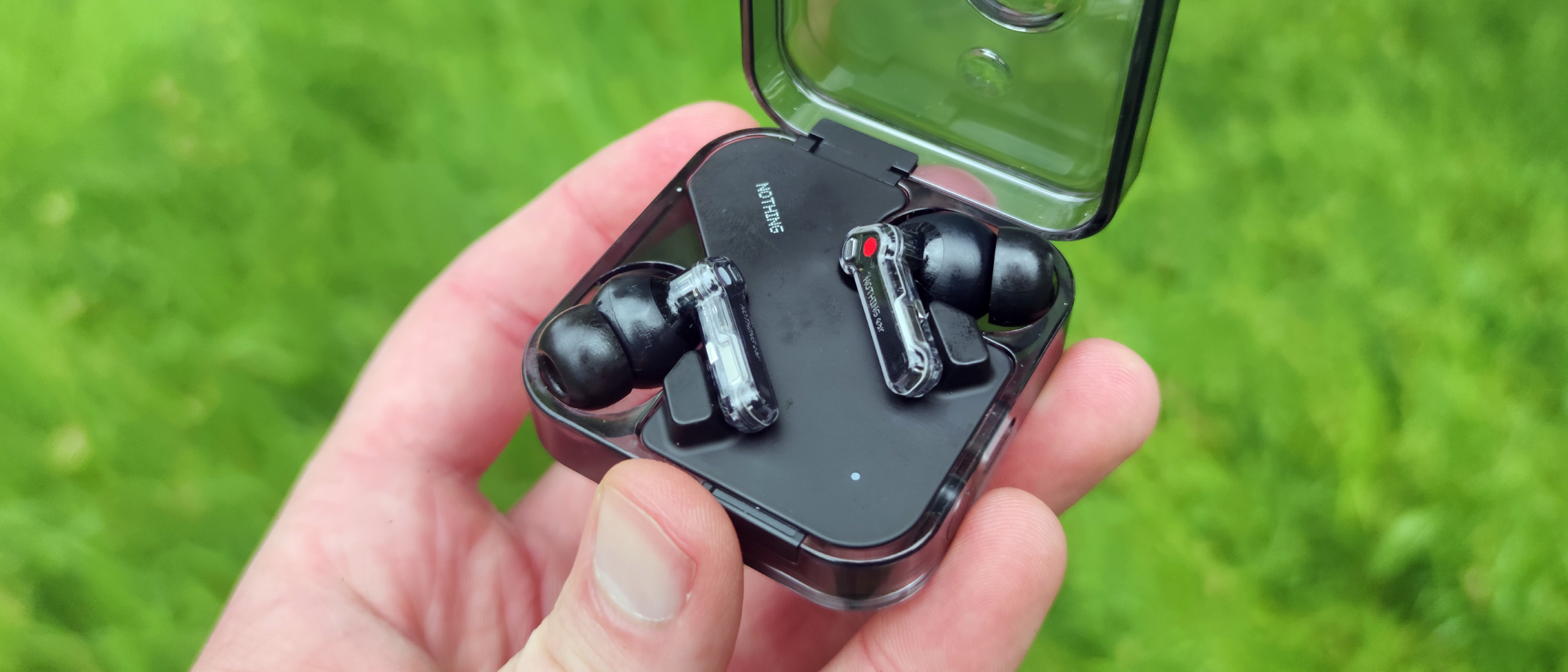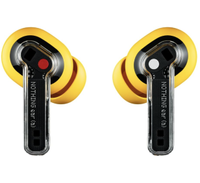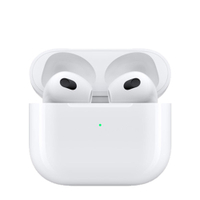TechRadar Verdict
The Nothing Ear present a near-perfect package with thumping bass, fantastic noise cancellation, a lightweight design that fits snugly in the ear and a range of handy extra features that you don’t always find in earbuds at this price. Putting the ‘near’ in ‘near-perfect’ are a few unfortunate features which I hope are fixed in the Nothing Ear (4).
Pros
- +
Earth-shaking bass
- +
Comfortable fit
- +
Impressive personalization
Cons
- -
Low maximum volume
- -
Cheap-feeling case
- -
Short battery life
Why you can trust TechRadar
Nothing Ear: Two-minute review
The Nothing Ear are actually the third-gen version of the company’s flagship earbuds line. If you're not up-to-date on your Nothing history, this should be enough to make you aware aware that Nothing cares, well, nothing about naming conventions.
In many ways, the shiny new Nothing Ear are really great earbuds for the price and among my favorite of all the in-ears I’ve tested for TechRadar. Having said that, I’d much rather be using whatever Nothing comes up with next than these new-for-2024 models. Might that be the Nothing Ear (4)? Who can say. For now, the Nothing Ear have a few glaring issues that – potentially ironed out in a future version – could be some of the best noise-cancelling earbuds out there.
My biggest issue with the Nothing Ear, something which plagued testing, was their surprisingly low maximum volume. When outdoors, the buds don’t reach even the quietest volume I like to listen to – even with decent noise cancellation, it was hard to enjoy music in noisy areas.
Next up is the battery life. Earbuds makers really need to understand that five hours of listening just doesn’t cut it in this day and age, when people spend more time with headphones on than off. I had to keep pausing my testing in order to let the buds charge – that isn’t a good sign, even if the case does hold quite a bit more juice.
Talking of the case, it’s made of a really cheap-feeling plastic is a contender for the least-nice-to-hold earbuds holder I’ve ever used. It creaks and flexes in the hand, and I feel like one drop from even the lowest-slung coffee table would crack it. That’s not even to make mention of the fairly uninspired and blocky look of the thing.
That's my main Nothing Ear gripes off my chest, early doors, so I can spend the rest of this review heaping on the praise they rightly deserve. The Nothing Ear offer spectacular audio for the money. The equalizer gives you total control over the buds’ sound, more so than in most rival products, and that’s doubly the case if you like a thumping, accurate, crisp bass.
If you felt the ground shaking in early June 2024, that wasn’t an earthquake – it was me testing these buds' bass. It’s incredible, and you can almost feel your head thumping at how vibrant the low frequencies are. For some, it might be too much, but that’s why it’s so great that the equalizer lets you bring out the sparkle in your music.
The Nothing X app also brings a fantastic sound detection technology, to try and tune music specifically for your ears. A few brands offer this but none has had such a dramatic effect on the listening experience as this one.
Sure, the Nothing Ear's charging case isn't the best, but the buds are much better: they’re lightweight and sit in your ear as reliably as an earring would – so much so, you can easily forget that you’re wearing them.
So there’s a lot to like here, and a fair bit to love, too – it’s just a shame that the Nothing Ear have those three glaring issues. I could look past any one of them alone, but together they make it hard to give the buds a higher review score.
Nothing Ear review: Price and release date
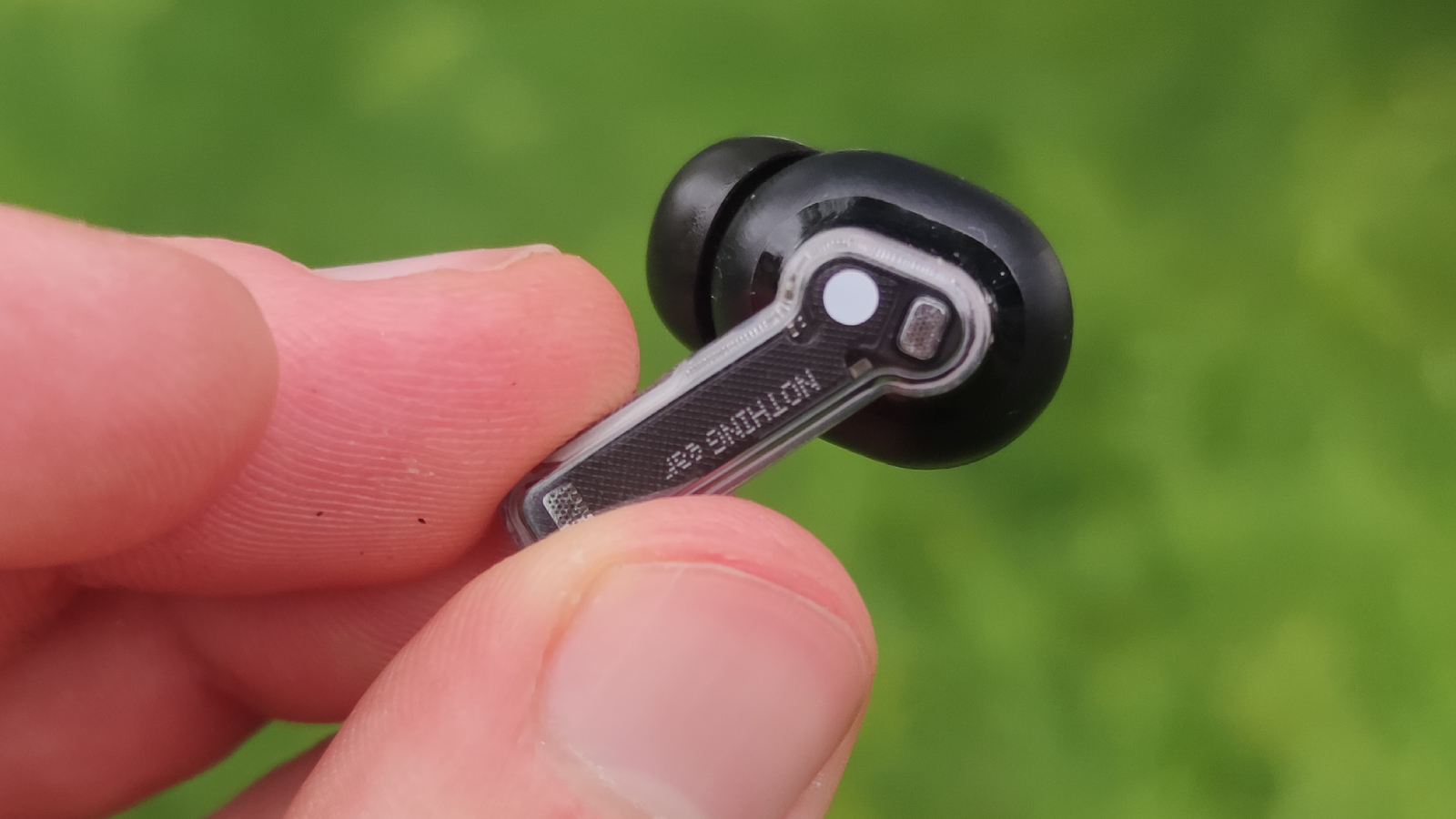
- Announced in April 2024 alongside Ear (a)
- Costs $149 / £129 / AU$249
The Nothing Ear was announced alongside the affordable Nothing Ear (a) in April 2024, with the buds hitting store shelves a matter of days later. This was just over a year on from the release of the Nothing Ear (2) – the Ear are follow-ups to those and how I wish the makers would have just called them the Nothing Ear (3), for simplicity’s sake. Got it? Good.
You can pick up the Nothing Ear for $149 / £129 / AU$249. That's how much the Ear (2) cost last year everywhere except in Australia, where a slight price bump has come into play.
That means you can’t quite consider these ‘cheap’ earbuds, but they’re certainly not pricey ones either. There’s not much competition at this in-between price point, with many earbuds aiming at customers who want to spend less than $100 / £100 / AU$200 and most of the step-up options costing double that.
But if you do want something for this specific price, there are a few options like the Beats Studio Buds, Jabra Elite 5, Sennheiser Accentum and of course the bog-standard Apple AirPods. Or check out our best earbuds page for various budgets.
Nothing Ear review: Specs
| Drivers | 11mm |
| Active noise cancellation | Yes |
| Battery life | 5.2 hours (buds) 24 hours (case) |
| Weight | 4.62g (buds) 51.9g (case) |
| Connectivity | Bluetooth 5.3 |
| Frequency response | 20-40,000Hz |
| Waterproofing | IP54 |
Nothing Ear review: Features
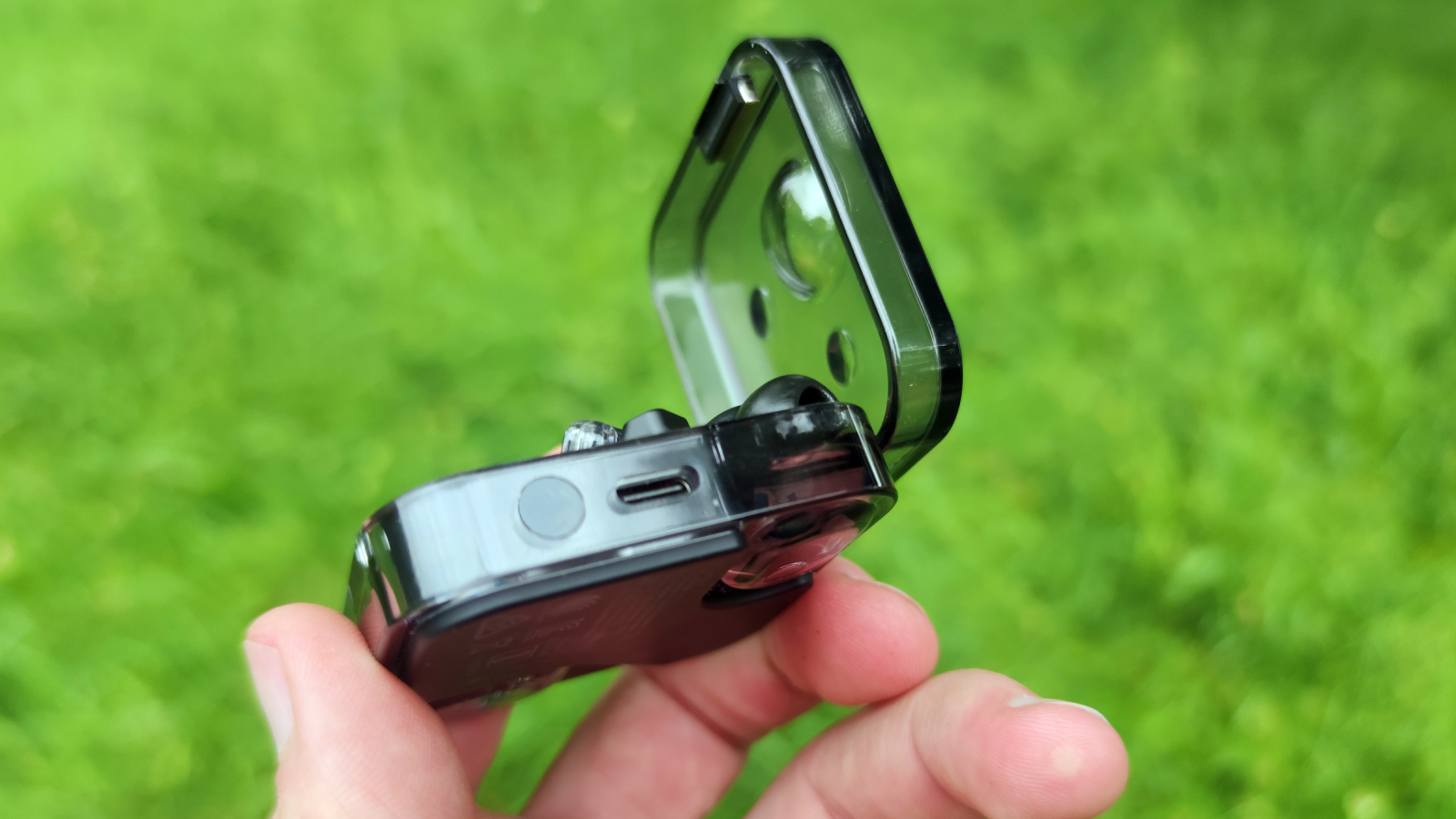
- 5-hour buds battery, 24-hour with case (when ANC is used)
- Decent noise cancellation, with caveats
- Nothing X app brings useful extras
Lots of the Nothing Ear's magic comes from their tie-in phone app called Nothing X. You don’t need the app, but lots of the features it brings are game-changers.
With the app you can set touch controls (discussed in detail in the Design section), fiddle with sound settings with an equalizer, bass booster and hearing test (all dealt with in the Sound quality section), toggle the noise cancellation (explored in the Features sect- oh, wait, that’s this one!) and change a few other settings like in-ear detection and which audio standard you stream from. Plus you can do an eartip fit test and find the earbuds if you lose them. That's a lot.
The noise cancellation is good – great in some circumstances and a little lacking in others. It’s not quite best-in-class for mid-range earbuds but it’s up there. There are six optional modes: off, Transparency (basically like an ambient mode) and four different intensities of standard ANC: high, mid, low and adaptive.
The latter, which I found myself using for most of the testing period, changes the level of noise cancellation based on where you are, which means the Nothing Ear aren’t using loads of battery to block out noise if you’re home alone.
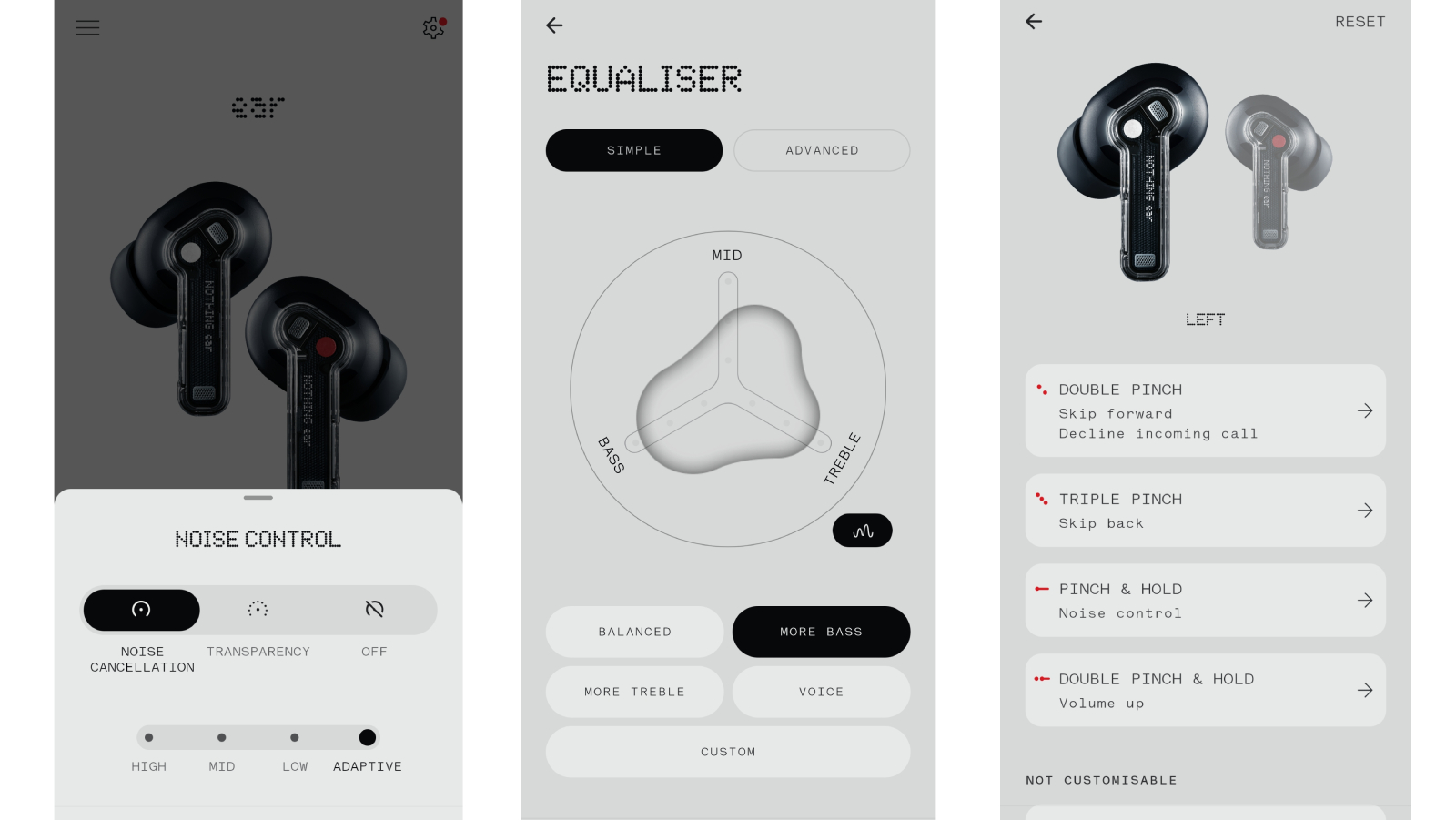
In most cases, the noise cancellation was good at removing background sounds, but it didn’t always succeed when there was a lot going on – a busy road near my house proved a bane every time I was near it. This combines with a volume issue that we’ll explore later on, to make the buds inadequate when you’re somewhere noisy.
The adaptive mode also felt slow to respond to changes in environment and often played catch-up when I was moving through different locations.
A bigger issue with the buds – or a shorter issue – is the battery life. When you’re using ANC, you can only listen to the Nothing Ear for about five hours before they need to be recharged, which really isn’t going to cut it. The case will give you a fair amount of lasting power, at 24 hours, and those figures are much better at 8.5 and 40.5 hours respectively if you opt to turn noise cancellation off.
From my testing, the adaptive noise cancellation did seem to give me a little extra listening time, so I’d recommend it for anyone who thinks five hours might be enough but aren’t totally sure.
The Nothing Ear connects to your phone or tablet using Bluetooth 5.3, which I found reliable – it only dropped once and that was for a second. And for all you wondering, you don’t need to connect the earbuds to a Nothing phone in order to enjoy all of their features.
Pairing is quick and easy, whether you’re connecting the buds to your phone for the first time or every other time you’re using them. I’ve got no complaints, and everything worked as intended – as did other features like the quick wear detection, the dual connections so you can pair the buds to multiple devices and jump between them and a latency mode, so the buds are handy for gaming.
You may also have heard that Nothing is now offering pinch-to-speak to ChatGPT integration across its earbuds, provided you own a Nothing Phone. I don't – and I think only a fraction of potential buyers here will be fully immersed in Nothing's ecosystem. But nevertheless, it's a feature worth mentioning – and it's available in Nothing's older earbuds lineup too. So, if you kit yourself out with Nothing Ear, Nothing Ear (a), the inaugural July 2021 Nothing Ear (1), the October 2022 follow-up Nothing Ear (Stick), the March 2023 Nothing Ear (2) or Nothing's budget CMF by Nothing Buds (including the CMF Neckband Pro and CMF Buds Pro) plus a Nothing smartphone (Nothing Phone 1, Nothing Phone 2 or Nothing Phone 2a) running the latest version of the app and ChatGPT, you'll be able to use it.
- Features score: 4/5
Nothing Ear review: Design
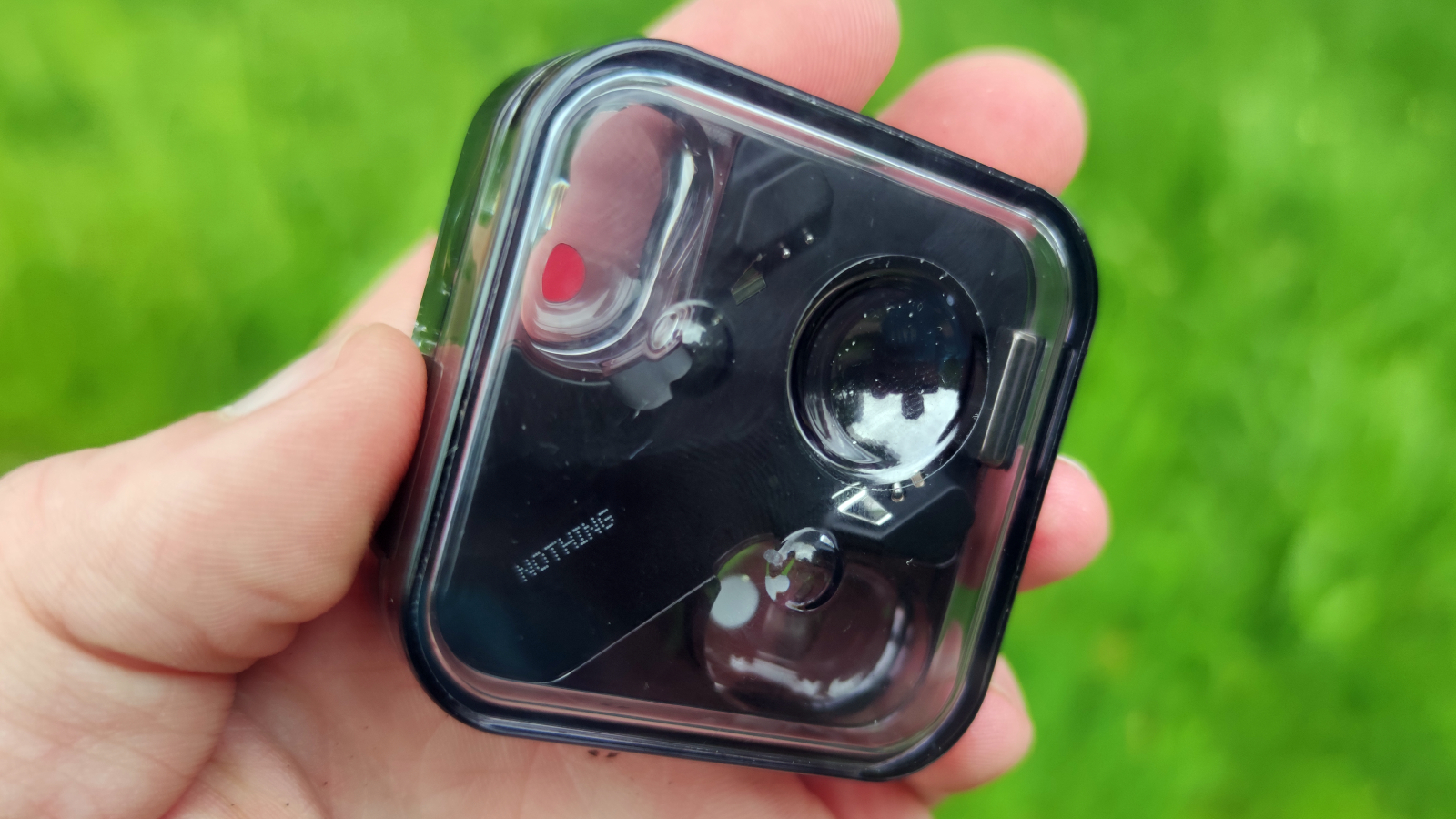
- Small and comfortable earbuds
- Buds have IP54, case has IP55 protection
- Tacky plastic case
You know what you're going to get with true wireless earbuds like the Nothing Ear: two small buds and a case.
In true Nothing fashion the case is see-through, letting you gaze adoringly upon the buds inside should the mood so take you. However, the plastic material used for the holder feels incredibly cheap – dare I say ‘tacky’? – and a little fragile, too. It creaks when you hold it too tight and it’s a shame that Nothing wouldn’t opt for a more premium design.
It’s a square case, a little bigger than some I’ve seen but it fits in pockets easily. It has a USB-C port on one side for charging and you can also charge wirelessly, although it’s pretty slow. The case measures 5.5 x 5.5 x 2.2 cm and weighs 51.9g.
The buds themselves are nice and small and at 4.62g each they’re lightweight in the ear. They’re stem-style buds which gives them a nice rigid fit, although the Nothing-style see-through look might put off fashionistas.
There’s a touch control on each stem and, while you can rely on them to pick up individual touches pretty easily, there’s a noticeable delay between a press and the action actually picking up. You can customize the actions for single, double and triple pinches as well as a single and a double pinch and hold, on both the left and right buds, giving you a whole host of customization over your gestures – if you can remember what each single action does, that is. I, frankly, could not.
The buds have an IP54 rating against dust and liquid, while the case is a slightly higher IP55. This means that both can survive all but the finest particles and also sprays of water droplets, with the case withstanding stronger showers of water.
- Design score: 3.5/5
Nothing Ear review: Sound quality
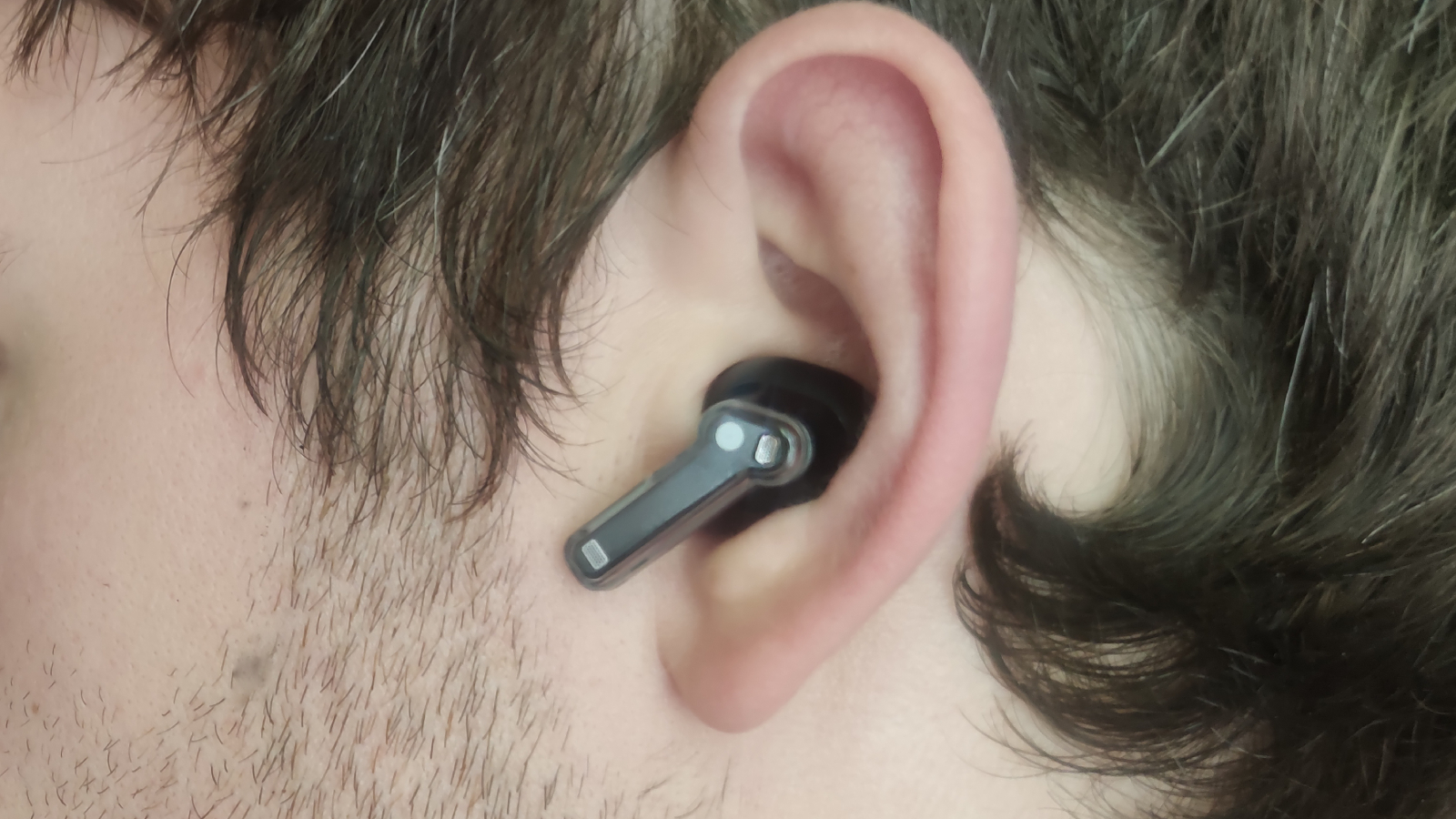
- Oodles of bass (in a largely good way)
- Responsive and handy equalizer
- Some distortion, but not much
The Nothing Ear sound pretty good for buds at this price, but they are absolutely fantastic for bass lovers. Seriously, these are second only to sitting on a bass amp blaring out Debaser by Pixies when it comes to thumping rhythms.
I spent my initial testing time with the ‘More Bass’ in the equalizer and the ‘Bass Enhance’ options turned on and the latter at its highest setting. And with these settings turned on, the bass is intense – you’ll hear it pushing past all the other parts of any song to sit forefront and I could almost feel my head vibrating with the music.
This incredible amount of bass can likely be attributed to two features. One is Nothing’s custom-built 11mm ceramic drivers made just for these buds (you won't find them in the Nothing Ear (a), which include more traditional solo dynamic drivers in each bud), and the other is an algorithm from the company which is designed to detect and enhance bass sounds in music.
If you’re not a bass fan, you’ll be glad to know that you don’t have to turn it up to 11 like I did, and in fact the buds sound great when all these modes are turned off. The default sound is quite bass-heavy, but you can change that.
The in-app equalizer lets you tweak the buds’ output whether you know how they work or not: a simple mode lets you spread sound between treble, bass and mid, while an advanced mode gives you a lot more versatility, and a sound personalization mode tests your hearing to work out a perfect mix for you.
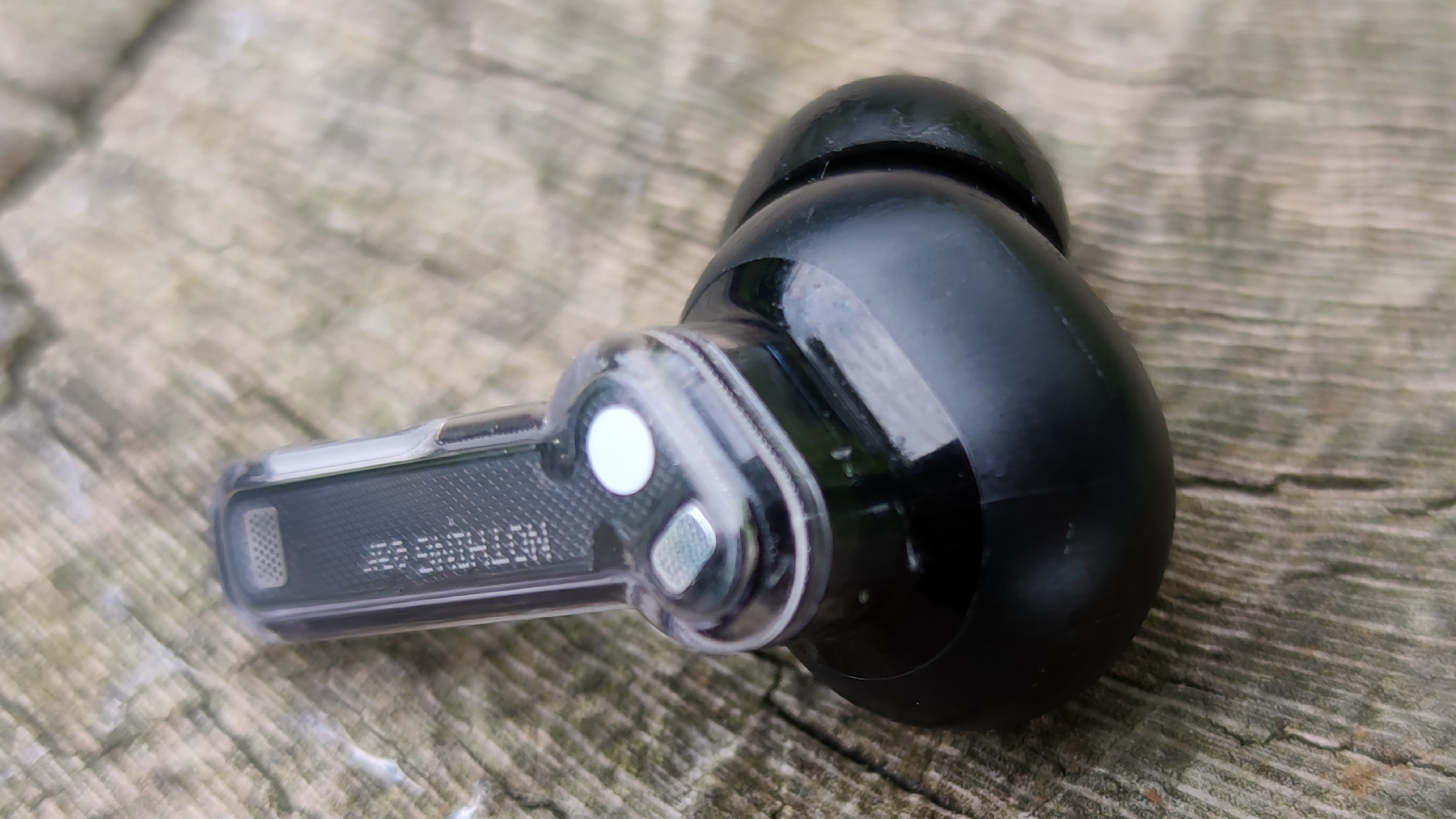
The latter is surprisingly effective, too, and the several-minute-long test helped me find a nice mix (while also making me realize that my hearing is quite different between my ears!). What’s doubly great is that you can use this test and the equalizer, so you can account for both your hearing and your preferences.
Nothing’s buds are strong whether you want to pull out some nice crisp treble, some sturdy mid or the aforementioned bass. And there’s enough clarity to give a decent amount of sound stage, more than you normally hear in buds at this price – you can hear different instruments spread around you.
I did notice a tiny bit of distorting on certain parts of songs, with acoustic guitars and hi-hats getting a little scratchy if I let the equalizer bring them too far forward in the mix, but you’re about to read about why peaking isn’t as much of an issue as it could be.
This has all been a lot of praise for the Nothing Ear’s audio but the buds do have one major issue – an Ear-chilles’ heel, if you will – when it comes to volume. The max volume is far, far too low.
At its highest output, the Nothing Ear are roughly as loud as my usual comfort volume when I’m indoors, and below it when I’m out and about. I’m not usually a fan of overly loud music, so these buds will really disappoint people who do.
It’s an issue most palpable when you’re out and about – the noise cancellation is good, but if you’re in a loud environment or just want to really feel the energy of the music you’re listening to, the Nothing Ear just don’t get loud enough to compete with what’s around you. And, yes, I spent ages digging around in the in-app equalizer and that’s not the issue.
- Sound quality: 4/5
Nothing Ear review: Value
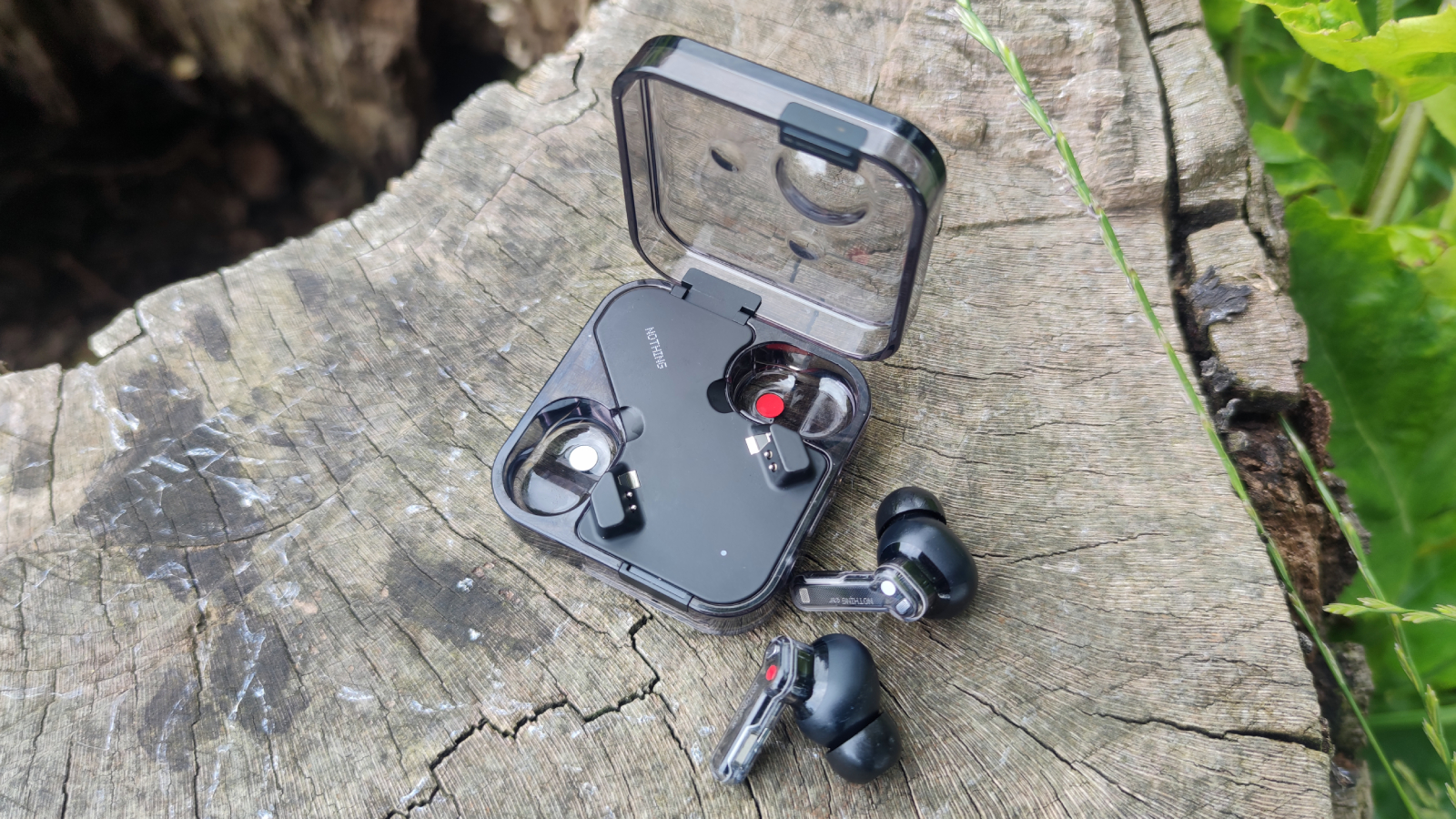
- Punchy above their price class
- Will compete with predecessors
Between the feature set and sound quality, the Nothing Ear are punching well out of their price class. Nothing could have charged 25 per cent more for these buds and they'd still be competitively priced.
You're getting more than you pay for by a country mile, with the Nothing X app's features in particular feeling incredibly premium.
If anything threatens to upset the Nothing Ear's value proposition, it's price cuts to the previous two generations of Nothing Ear, as well as the more affordable Nothing Eer (a). Each bring similar feature sets but for a lower price, so if you don't need all the trimmings of the top-tier offering, you could be swayed by them.
- Value: 4/5
Should I buy the Nothing Ear?
| Attributes | Notes | Rating |
|---|---|---|
| Features | A weak battery life barely detracts from a fantastic range of features. | 4/5 |
| Design | The buds are lightweight and petite, but the case feels cheap. | 3.5/5 |
| Sound quality | Besides the horribly low maximum volume, the Nothing Ear sound great, especially if you like bass. | 4/5 |
| Value | The Nothing Ear outstrip all their competition. | 4/5 |
Buy them if…
You like maximum bass
If you don't know the words 'too much bass', then the Nothing Ear's bass enhance mode will be a dream come true.
You like customizing your audio
The Nothing X app brings wonderful amounts of versatility with its equalizer and extra features.
Don’t buy them if…
You like loud music
We've got the thumping bass, but if you like it to be both loud and thumping, the Nothing Ear's low maximum volume will disappoint you.
You like long listening stints
With a very low battery life (when ANC is on) the Nothing Ear won't suit people who like to listen for a long time in one go.
Nothing Ear review: Also consider
| Nothing Ear | Nothing Ear (a) | Apple AirPods (Gen 3) | Beats Studio Buds | |
|---|---|---|---|---|
| Drivers | 11mm | 11mm | 11mm | 8.2mm |
| Active noise cancellation | Yes | Yes | No | Yes |
| Battery life | 5.2 hours (buds) 24 hours (case) | 5.5 hours (buds); 24.5 hours (case) | 6 hours (buds) 30 hours total (with case) | 5 hours (buds) 15 hours total (with case) |
| Weight | 4.62g (buds) 51.9g (case) | 4.8g (buds); 39.6g (case) | 4.28g (buds); 37.9g (case) | 5g (buds); 48g (case) |
| Connectivity | Bluetooth 5.3 | Bluetooth 5.3 | Bluetooth 5.0 | Bluetooth 5.2 |
| Waterproofing | IP54 | IP54 | aIPX4 | IPX4 |
Nothing Ear (a)
We gave five stars to these budget alternatives to the new Nothing Ear. They're small, have great sound and boast smashing noise cancellation. Plus, they're cheaper than the Nothing Ear.
See our full Nothing Ear (a) review
Apple AirPods (Gen 3)
These little-known earbuds (sorry) cost roughly the same as the Nothing Ear. While they don't have ANC, their battery life is much longer and they have a few Apple-centric features like its own-brand Spatial Audio.
See our full Apple AirPods 3 review
How I tested the Nothing Ear
- Tested for over two weeks
- Tested at home, in the office and on walks
I used the Nothing Ear for two weeks prior to writing this review and testing was mainly done with the buds paired to my Xiaomi phone, though I did use it on a Samsung one for a while, too. I didn't test it with a Nothing phone.
During testing I listened to various genres of music, played games and watched TV shows. I did so across various mixes, sound profiles and music features on the Nothing X app and, as mentioned, also used the hearing test halfway through the testing process. I listened at home, in my office and on many walks around my local area, as well as central London.
The Nothing Ear is just the latest of many gadgets I've tested for TechRadar over five and a half years, which includes many other earbuds, smartphones, tablets, speakers and more.
- First reviewed in June 2024

Tom Bedford joined TechRadar in early 2019 as a staff writer, and left the team as deputy phones editor in late 2022 to work for entertainment site (and TR sister-site) What To Watch. He continues to contribute on a freelance basis for several sections including phones, audio and fitness.
